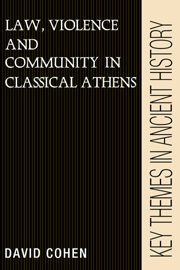Book contents
- Frontmatter
- Contents
- Preface
- PART I THE REALM OF THEORY
- PART II THE REALM OF THE COURTS
- 4 Rhetoric, litigation, and the values of an agonistic society
- 5 Litigation as feud
- 6 Violence and litigation
- 7 Hubris and the legal regulation of sexual violence
- 8 Litigation and the family
- Conclusion: litigation, democracy and the courts
- Bibliographical essay
- Bibliography
- Index
6 - Violence and litigation
Published online by Cambridge University Press: 06 January 2010
- Frontmatter
- Contents
- Preface
- PART I THE REALM OF THEORY
- PART II THE REALM OF THE COURTS
- 4 Rhetoric, litigation, and the values of an agonistic society
- 5 Litigation as feud
- 6 Violence and litigation
- 7 Hubris and the legal regulation of sexual violence
- 8 Litigation and the family
- Conclusion: litigation, democracy and the courts
- Bibliographical essay
- Bibliography
- Index
Summary
Chapter 5 set out a framework for comprehending Athenian litigation as feud and for viewing the process of judicial judgment as operating within an agonistic social field. Of course, not all lawsuits and prosecutions at Athens fit this pattern. It is not possible, in any event, to generalize about “typical” litigants or “typical” trials because we lack the quantitative evidence which alone could permit us to say how representative are the cases preserved in the corpus. One can assert, however, that the characterization of Athenian litigation developed in Chapter 5 reflects a very substantial part of that corpus. In support of this assertion, the next three chapters will apply the notion of litigation as feud to three particular areas of legal relations. The present chapter will examine cases involving the laws regulating assault and wounding, while Chapters 7 and 8 will take up disputes over inheritance and sexual wrongdoing.
The first case involves an action for damages based on an allegation of assault and injuries arising from a severe beating. The case is known because Demosthenes wrote the oration for the well-to-do young man, Ariston, who claims to be the victim of this violence. This remarkable speech displays the full range of topoi elaborated in Chapter 5 and illustrates the way in which orators drew upon this repertoire in appealing to the normative expectations of their audience.
- Type
- Chapter
- Information
- Law, Violence, and Community in Classical Athens , pp. 119 - 142Publisher: Cambridge University PressPrint publication year: 1995

